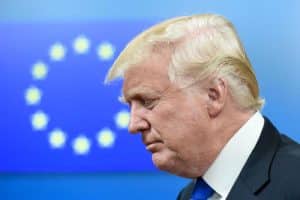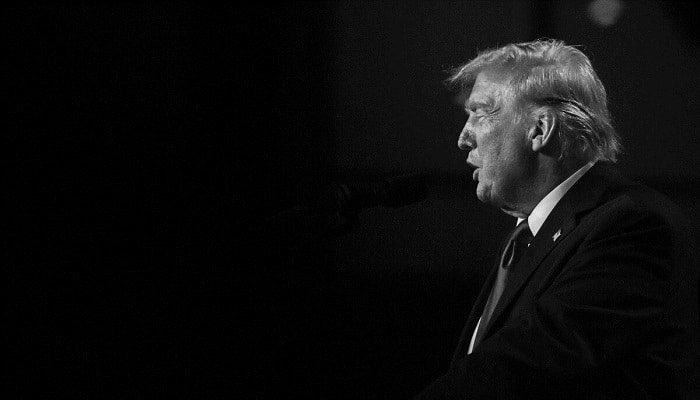PNN – The victory of “Trump” in the US presidential election was not an unexpected surprise for the European Union. However, in the face of the continuation of the conditions that the victory of the Democratic candidate Kamala Harris meant, the return of this Republican politician to the White House is probably the economy. It will destabilize the security and politics of the European bloc.
According to the report of Pakistan News Network, “Donald Trump” is preparing to lead the country as the President of the United States in less than a month, but it seems that the European Union is not ready for the return of this Republican politician. The situation that almost all European capitals, especially Brussels, hoped to avoid has become a reality: Trump will return to the White House on January 20, 2025 and begin a new four-year term.
In his first term, Trump called the European Union a “foe”, imposed tariffs on key products such as steel and aluminum, and repeatedly threatened the bloc with a trade war. He also questioned key European environmental and multilateral agreements, such as the Paris Agreement, and resorted to protectionist measures that led to friction with European allies and affected transatlantic relations.
Trump has broken Washington’s traditional alliances, criticized NATO and pressured its members to increase defense spending. He also promoted a policy that highlighted the leadership of “strong men”; In this regard, Trump strengthened his relations with authoritarian and nationalist figures who had a personal idea of politics and tended to use social networks extensively.
J.D. Vance, the new vice president of the United States, is exactly one of the biggest opponents of helping Ukraine. He has supported ending the war in Ukraine by canceling US aid and believes that Europe should defend itself “without the US”.
Read more:
Trump’s greed for Greenland and Panama; American imperialism without retouching
Will Trump’s return force Europe to take more responsibility for its own security?
In the military sphere, although Europe has made a significant contribution to support Ukraine, the biggest burden remains on Washington’s shoulders. This reflects inadequate, fragmented and inefficient investment, in addition to Europe’s limited capacity to increase defense production and replenish ammunition and weapons stockpiles. According to a report by Mario Draghi, the former president of the European Central Bank and the former prime minister of Italy, published on the Economist website, 78% of the equipment used by European armies is purchased outside the EU, and only 18% of the orders are coordinated in Europe.
Trump has already stated that he does not intend to support NATO as it is currently going. According to Bloomberg, NATO may raise its military spending cap to 3 percent of member countries’ gross domestic product by 2025, and Trump plans to increase arms sales in Europe. Obviously, the final decision on possible American intervention in the defense of the Europeans will rest exclusively with the American government, and therefore, even if Europe pays the price, it will never be sure that its ally will defend it.
Therefore, on a logical level, there can be only one solution to the problem of European security: the creation of an autonomous defense mechanism. French President Emmanuel Macron and Polish Foreign Minister Radek Sikorski have argued that Trump’s return to the White House should force Europe to take more responsibility for its own security. But building a European army in the absence of a European country and even without having a homogeneous foreign policy among European countries is very complicated, if not impossible.
Trump’s friendship with European nationalist politicians from the right wing
What is clear is that Trump does not have a very friendly view of the European Union and supports all right-wing European nationalist politicians who are somehow against the Union; From “Nigel Farage” in England to “Victor Orban” in Hungary, “Matteo Salvini” in Italy and “Aleksandar Vucic” in Serbia. With them and others, Trump will form a kind of “illiberal international” that will strongly influence the European policy on the issue of immigrants. In addition to Orban, Italian Prime Minister Giorgia Meloni and Austrian Chancellor Karl Nehmer are ideologically close to Trump. The Dutch government with its pro-Russian stance supported by the populist, anti-Islam and anti-immigration politician Geert Wilders may also become an ally of Trump.

European economy at risk of tariffs and protectionist policies of Trump
On the economic level, it is clear that Trump plans to increase tariffs to balance the US trade balance; the president-elect of the United States threatened the European Union, if it does not compensate Washington’s trade deficit by buying its oil and gas on a large scale, it will be subjected to more and more customs tariffs. According to a Reuters report, the US is currently facing a trade deficit of 240 billion dollars with Europe, and the tariffs are hitting the European economy hard.
One of the sectors that will suffer the most will be the automobile industry, especially Germany. According to Eurostat data, Germany will suffer the most damage from the US tariffs. In 2023, Germany exported 157.7 billion euros worth of goods to the United States. Italy and Ireland followed with 67.3 billion euros and 51.6 billion euros of exports, respectively. These three countries together account for 55% of EU exports to America. And so, they will be most affected by Trump’s protectionist policy.
Trump’s strategy in the trade war with Europe will be “divide and rule”. The new American government intends to deal with trade issues not at the multilateral level and not so much with the European Union, but with individual countries in order to have more negotiating power.
On Trump’s protectionist policies, investment bank Goldman Sachs predicts that the euro could fall as much as 10 percent against the dollar as the Federal Reserve continues to push rates higher than the European Central Bank. International money flows will be directed towards the Federal Reserve. However, currency volatility is particularly unpredictable and can therefore move in one direction or another. But there is no doubt that tariffs will have a strong impact on the dollar and the euro, and as a result, on all financial markets. The outlook, at least in the short to medium term, is that the European currency will weaken and the US currency will strengthen. In the long run, if Trump’s economic policies fail, as is likely, the exact opposite will happen.
It is obvious that Trump will be completely against any agreement with Europe and other countries on climate and any kind of regulation and standardization, for example on artificial intelligence, medicines and green technologies. In general, deregulation will become the dominant criterion and Europe will have to regulate its own new technologies.
Is Trump pulling the brakes on Europe’s war-making in Ukraine?
Trump’s greatest impact in the White House can be evaluated at the geopolitical level; Trump has promised peace in Ukraine and, vaguely, peace in the Middle East; while claiming that the Zionist regime has the “right to defend itself”.
The problem of the Europeans is that the Middle East is vital for their interests because the Arab countries are the largest suppliers of oil and gas in the world, along with Russia and the United States; In addition, there are warnings that a war in the Middle East could quickly turn into a global nuclear conflict.
Unfortunately, the only thing that is almost certain is that the suffering people of Palestine will not be recognized with the right to land and country, and the tragedy of Palestine will probably continue.
In the case of Ukraine, although Trump’s possible action to create peace will benefit Russia, it will be favorable for Europe; Europe, which is weak at the military level and has paradoxically, appeared as a belligerent. Since Ukraine’s declaration of independence in 1991, conflicts with Russia have been fueled by NATO military expansionism led by US governments with the passive acquiescence of European governments.
NATO’s presence behind Russia’s gates and pretending to believe that this challenge is not a threat to Moscow was a serious strategic error. Therefore, the war in Ukraine should and could have been avoided from the beginning. The war in Ukraine would never have happened if Ukraine under the presidency of “Volodymyr Zelensky” did not insist on joining NATO with the support of other European countries; NATO, which is not an economic organization for sustainable development, not an association for progress and civil rights, but a military organization that has previously performed poorly in Serbia, Kosovo, Afghanistan, and Iraq.
Therefore, the umbrella that was re-established in Europe during the Biden presidency was dismantled after the election, and the new Trump presidency seems to be the beginning of the new challenges in transatlantic relations.

